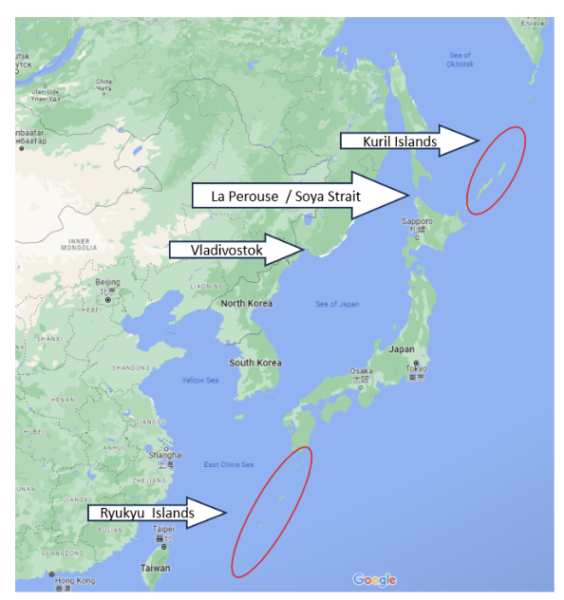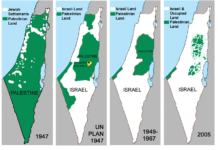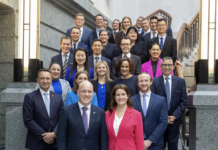The Pacific Islands Forum, the United States and its Pacific commitments
Last week, we discussed President Joe Biden’s second Pacific Summit hosted at the White House. A key issue was the significant funding commitment that the United States has made to Pacific nations. The commitments are an essential part of United States diplomacy in the Pacific but cannot currently be delivered because of domestic American political infighting. The situation is undermining America’s diplomatic position in the Pacific.
Generally, Pacific leaders seem philosophical about the situation. However, it is likely that this issue will have been a topic of private discussion at the Pacific Island Forum Trade Minister’s meeting last week. It is also likely to be a topic of discussion at the next full Pacific Island’s Forum meeting on 6-10 November. This meeting is approaching fast and is likely to include some lively discussion about a range of security and economic issues that will provide insight into Pacific diplomacy. Can President Joe Biden start delivering the US $ 200 million his administration has committed too by then? Or if he cannot will there be an immediate impact on United States credibility in the Pacific?
United States Pacific foreign policy, is sometimes criticised for focussing too much on defence rather than economic support. Hence, the roughly US $ 810 million of commitments made at the last Pacific Summit are important, demonstrating that the United States is focussed on economic and social issues rather than just defence issues. An important message for the Pacific community.
US Marines, Australians and Philippines exercise together
In late September, soldiers from the United States Marine Corps Darwin Rotational Force (or marines permanently based in Darwin, Australia) joined soldiers from the Philippines and Australia to exercise combined operations in the Philippines.
The force deployed from Darwin, sailing to the Philippines in amphibious warfare ship HMAS Canberra. During the voyage, the soldiers worked together on tactics and procedures for amphibious assaults. In the Philippines, the exercise included landings and operating American MV – 22B tilt rotor aircraft from HMAS Canberra, testing capabilities and providing opportunities to practice using each other’s equipment (inter-operability).
Practicing deployments from Australia to the Philippines is an important activity because if China did invade Taiwan, the Philippines will become a key staging area for United States support to the island. It is probable that planning exists to logistically support allied forces in the Taiwan – Philippines engagement area from Australia. The rapidly developing defence infra-structure in Australia’s north would play a role providing a large and safe base area for second- and third-line support for an operation of this nature.
United States and Japanese defence officials meet
On 4 October, Lloyd Austin United States Secretary of Defence and his Japanese counterpart Defence Minister Kihara Minoru met in Washington. The meeting was an opportunity for both parties to re-affirm their mutual commitment to the Japanese-American alliance and to demonstrate their nations strong defence partnership.
Japan is a key United States ally in the Pacific, and Secretary Austin praised Japan’s increase in military spending and the nation’s commitment to shared goals specifically working together to maintain a ‘free and open Indo-Pacific.’ This expression is an American tag-line that appears in many Indo-Pacific command media releases that could be translated as ‘keeping maritime trade routes open.’
Japan has a large military, and its position means that in a conflict it could control both Chinese and Russian access to the Northern Pacific. The nation controls the Sea of Japan, this sea’s northern ice-free exit into the Pacific, the La Perouse or Soya Strait is only about 40km wide. Further, in a war Japan is well prepared to take the Kuril Islands to its north, a territory seized from Japan by Russia in World War Two. In the 2010s, Japan created a new amphibious brigade and commissioned two Izumo-class helicopter carriers that can be converted into small aircraft carriers capable of supporting amphibious operations. Loss of the Kurils closes Russia’s access from of the Sea of Okhostk into the Pacific. Additionally, Japan’s small southern islands, the Ryukyu Chain reach almost to the Philippines closing off access to the East China Sea. Japan’s potential to help isolate China and Russia and its significant military power make it a key building block of United States and allies strategic planning, evidenced by NATO’s liaison office for the Pacific being established in Tokyo.

Melanesian update
A regular update on the Pacific’s least reported trouble spot; Melanesia.
Piracy reports in Papua New Guinean waters
On 7 October, the Australian Broadcasting Corporation reported that Manus Islanders are concerned about the security of betel nut shipments to Papua New Guinea after raids by pirates.
Another example of the difficulties maintaining the rule of law faced by Papua New Guinea’s government. The nation’s large size, rugged terrain and weak institutions mean that activities like piracy and inter-tribal fighting are too common.
Papua New Guinea receives another patrol boat from Australia
This week Papua New Guinea took delivery of another Guardian Class patrol boat, HMPNGS Gilbert Toropo. Papua New Guinea has now received four of these vessels to replace its aging fleet of patrol boats.
Guardian Class patrol boats are small, about 40m long, coastal vessels with range of about 5,600km and a crew of 23. Although, not delivered armed the vessels can be fitted with light weapons like a 30mm cannon or machine guns. However, the best equipment in the world is useless without training and maintenance support. Papua New Guinea’s weak military institutions may not be able to maximise the benefit of this type of aid so it is important to consider other types of support like training or economic aid to build businesses able to maintain patrol boats.
Papua New Guinea and Australian relations sour over detention centre costs
While China is making significant diplomatic gains in Melanesia, Australia’s reputation in the region took another hit this week as Papua New Guinea claims that Australia owes it $ 48 million dollars for detaining illegal immigrants.
Australia has a history of using places like Nauru and Papua New Guinea as offshore detention centres for illegal immigrants. A policy that has been criticised for many years by the international community. In 2016, the Papua New Guinea Supreme Court ruled that detentions of this nature were illegal the arrangement has slowly stopped.
However, there are still 70 people living in Papua New Guinea that the nation has said Australia must pay for or they will be sent to Australia. This situation is an example of the difficulty that Australia has maintaining relationships with its Pacific neighbours. A situation that will need to change if it is to compete diplomatically with China for influence in this region.
Political instability continues in Vanuatu
Vanuatu now has a new Prime Minister, after previous Prime Minister Sato Kilman was voted out in a motion of ‘no confidence’ on 6 October, and Charlot Salwai elected. Vanuatu’s last election was in October 2022 and over the last two months its parliament has been through two motions of ‘no confidence’ in Prime Ministers, one in the Speaker and a ‘walk out’ by MPs.’
Vanuatu is currently demonstrating the level of political instability that makes Melanesia such a potentially dangerous place for Sino-American competition. When and where ever nations are politically unstable there are opportunities for external powers to influence their politics, taking advantage of weak governance to advance their own agendas.





Biden has just announced, via his anus, that the attacks on Israel was, and here’s the quote:
Headline. The Guardian.
“Israel-Hamas war live: Israel defence minister ‘releases all restraints’ on troops; Biden calls Hamas attack an ‘act of sheer evil’ ” Rich coming from a blood thirsty geriatric yank who isn’t sure which way’s up don’t you reckon.
The ‘mericans have China and that general area ring-fenced by their wondrous Weapons of Mass Distruction selves. Their very own military industrial complex factory hand jobs to psycho’s like netenyahoo are common knowledge.
Here’s what needs to happen. God Him/Her/Itself comes down/out/over/beside the Heavens ™ and gives nuts who like wars bigger penises and a crate of Ecstasy pills, powders would do. Then, give them all a tree to sit under and a mirror to admire themselves by so they can leave the rest of the only planet we have the fuck alone.
Oh! And one more thing.
RNZ.
“How much power will new data centres use?”
https://www.rnz.co.nz/news/national/499883/how-much-power-will-new-data-centres-use
FUCK! The data centres. And fuck Cock Nose bezos, the donkey-laughing fucking psycho. The nano-second that greasy little alien gets his tenticles in the door here we become targets needing defence and who better than the war mongering nut job ‘mericans.
If the natzo’s get in, we’ll become a republic, then we’ll become ‘merican property if, indeed we’re not already.
I’ve always wanted to be a fentanyl addict living under a bridge giving blow jobs to rich trannies.
A NATO office in Tokyo? Excellent, in between plotting perhaps they can watch reruns of the Enola Gay bombing run and Tora Tora Tora.
A NATO office in Tokyo? Excellent, in between plotting perhaps they can watch reruns of the Enola Gay bombing run and Tora Tora Tora.
I await Ben Morgan’s next Intelligence Update, and his views on the latest flare up of violence in the Middle East and what it means for the globe.
War in Europe, War in Africa, War in the Middle East, tension in the Pacific.
As the superpowers maneuver around each other’s trying to penetrate each other’s sphere’s of influence, trying to find some opening. What are the chances that these clashes will coalesce into something bigger?
And what this will mean for us?
From the quality of his updates I am guessing that Ben Morgan has some insight into New Zealand’s military community, and how they see the world.
Big Ups to Ben for keeping us informed of what they are thinking.
Infinite growth on a finite world is a recipe for disaster, we all need to know what the cooks are up to.
From the Boer War to Afghanistan, and every other war in between, New Zealand has so far never missed an opportunity to be involved in expanding or defending the frontiers of empire.
War and expansion is not a choice for capitalist growth economies it is an imperative.
It will be good to know what our local military chiefs are planning for us.
Keep up the good work Ben.
https://bankslist.ru/